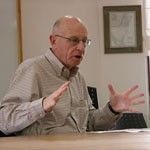
JERUSALEM — Israel’s government is closely divided among its parties. And each of the ministries has its experts. Plus the figures in the media. Each seemingly anxious to express about coronavirus, its variants, tests, and treatments.
Are we in the midst of a disaster, along with a lot of noise?
KISS (keep it simple, stupid) doesn’t work in such a condition, with so many activists competing to be heard.
Likewise in the U.S., with its 50 states and thousands of local governments, plus the noise of contending proposals, decisions, and criticisms.
Europe is similar, with a variety of national governments, partial or complete shutdowns, and lots of infections.
Omicron spreads fast, but is, apparently, less dangerous than other variants. Yet hospitals are crowded, and in some cases postponing the receipt of patients not in danger. And lots of medical facilities and other services are slowing down, or canceling activities as workers call in sick. High rates of infection in the U.S. put that country in our red group, with limited travel to and from Israel.
Huge lines for being tested, with some of the kits being sold for home use said to be unreliable in their results.
Israeli infections are reaching more than 18,000 daily. Complicated new rules on testings, as well as periods of isolation. We can bet that officials responsible for implementing them will be confused, and cite different parts of the changing rules.
The hometowns of our grandchildren are now in the red zone, and we have postponed our visits. So far our retirement village is clean, but we’re worried. And we’ve had our fourth shot. We have tighter controls on who and how many can visit each resident.
More countries seem to be accepting mass infections, and hoping for the best with respect to the capacity of hospitals to care for serious cases.
Politics, at least in democracies, includes perpetual disputes and many arguments. Often they’re between factions or parties, with individual ego never far from the scene. Both the U.S. and Israel are finely divided, as are several European countries. And the disputes inherent in coronavirus are front and center. What’s politics? And what’s professional dispute? It’s difficult to sort out the two kinds. One overfolds the other. The importance appears on every news show, often beginning with the latest reports about infections, hospitalizations, deaths, and the pressure on facilities. The prominence of the issue resembles that of warfare. It produces obsesion among elected officials, the professionals in administrative positions, media personnel, and the variety of experts called upon by one or another for their opinions and projections.
And among our puzzles: the airport is now open, for travel to and from all countries. No longer any red countries. Requirements of being vaccinated and tested, but we know about forged documents. And in the context of high infection rates just about everywhere? What’s the point of opening ourselves to tourists? Except, perhaps, to please the tourist industry.
A headline in the Times of Israel stated, “Bennett appeals for ‘patience’ amid public dismay over shifting, unclear COVID rules.”
Explanations are neither simple nor quiet. Nor conclusive.
Ira Sharkansky, Ph.D., is professor emeritus of political science at Hebrew University. He may be contacted via ira.sharkansky@sdjewishworld.com